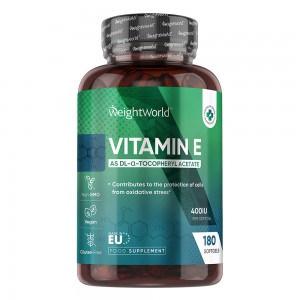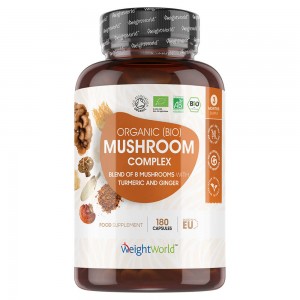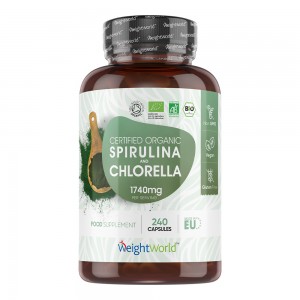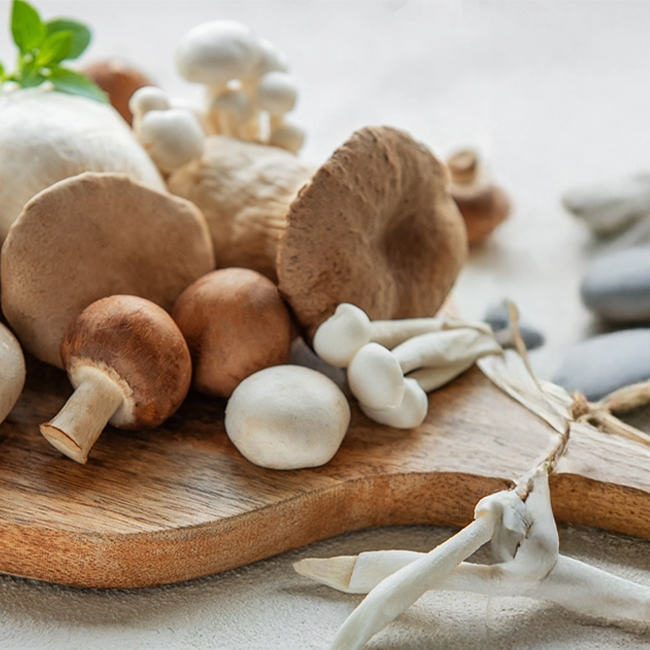
Immunity
Are Mushrooms Good for You? 9 Incredible Benefits of Mushrooms in Your Diet
10 Min. Read 15 Dec 2025
On this page
- Is a Mushroom a Superfood?
- Can I Eat Mushrooms Every Day?
- What Are the Different Types of Mushrooms?
- Benefits of Including Mushrooms in Your Diet
- What Is the Most Nutritious Mushroom?
- The Nutritional Profile of Mushrooms
- When to Take Mushroom Supplements?
- WeightWorld Organic Mushroom Complex - 180 Capsules 1000mg
- Know How to Eat Mushrooms
- Side Effects of Eating Too Many Mushrooms 6
- Final Say
- FAQs
- Sources
Mushrooms often get overlooked in the vegetable aisle, but these little fungi pack a powerful nutritional punch. Loaded with essential vitamins, minerals, and antioxidants, they offer a variety of health benefits. But are mushrooms good for you enough to be considered a daily staple? Absolutely!
In this piece, we’ll dive into the many advantages of adding mushrooms to your diet, explore different types, and learn how mushroom supplements can be perfect for you. From boosting your immune system to providing an array of essential nutrients, mushrooms may just be the superfood you’ve been searching for.
Is a Mushroom a Superfood?
Yes, mushrooms are increasingly being recognised as a superfood. But what qualifies them for this status? Superfoods are typically rich in nutrients and antioxidants that help combat diseases and improve overall health. Mushrooms fit the bill perfectly.
They are low in calories yet dense in essential nutrients such as selenium, potassium, and B vitamins, making them an excellent addition to your diet.
Additionally, mushrooms contain beta-glucans, compounds known for their immune-boosting properties. So, if your query is "Are mushrooms good for you?", the answer is a resounding "Yes!" as they bring significant benefits to your overall well-being.
Can I Eat Mushrooms Every Day?
The idea of eating mushrooms daily might seem odd to some, but it's a great habit to adopt. Mushrooms are a versatile food that can be eaten raw, cooked, or even as a supplement. Regular consumption can help you maintain healthy cholesterol levels, support your immune system, and promote cognitive health.
However, like everything else, moderation is key. Eating mushrooms every day is safe for most people, provided you mix up the types of mushrooms to avoid nutrient imbalances. Just ensure they’re part of a varied and balanced diet.
What Are the Different Types of Mushrooms?
Mushrooms come in various types, each with its unique flavour, texture, and nutritional profile. Here are some of the most popular edible ones:
- White Button Mushrooms: The most common variety, found in most kitchens.
- Shiitake Mushrooms: Known for their rich, earthy flavour and immune-boosting properties.
- Portobello Mushrooms: These large mushrooms are perfect for grilling and provide a meaty texture.
- Reishi Mushrooms: Traditionally used in Eastern medicine, known for their calming effects.
- Chaga Mushrooms: Another medicinal mushroom, recognised for its immune-enhancing properties.
- Lion’s Mane Mushrooms: Popular for cognitive health and nerve regeneration.
Each type of mushroom provides unique health benefits, so incorporating a variety can offer a broader spectrum of nutrients and compounds.
Benefits of Including Mushrooms in Your Diet
Now for the part you’ve been waiting for—the nine benefits of mushrooms in your diet:
1. Support Your Immunity
Mushrooms like Reishi and Shiitake are packed with beta-glucans, which can activate immune cells and enhance your body's defence against infections. A 2015 study1 published in the Journal of the American College of Nutrition found that consuming Shiitake mushrooms daily led to improved immunity and reduced inflammation.
2. Promote Your Heart
Mushrooms are naturally cholesterol-free and contain compounds like sterols, which help lower bad cholesterol (LDL) levels. Research2 published in the Nutrition Journal in 2012 showed that regular mushroom consumption could help reduce cholesterol and lower the risk of cardiovascular diseases
.3. Support Brain & Cognition
Lion’s Mane mushrooms are known for their neuroprotective properties, promoting brain function and nerve regeneration. A 2009 study3 from Phytotherapy Research discovered that Lion's Mane extract could improve cognitive function in individuals with mild cognitive impairment, offering potential protection against age-related memory decline
.4. Assist in Weight Management
Mushrooms are low in calories but rich in fibre, which helps you feel full longer, supporting weight management and reducing overeating. A study4 in Appetite Journal (2011) found that substituting red meat with mushrooms in meals helped participants reduce calorie intake while feeling equally satisfied.
5. Provide Antioxidants
Mushrooms, particularly varieties like Porcini and Chanterelles, are rich in antioxidants such as ergothioneine and glutathione, which help protect your cells from oxidative damage. A study5 published in the Journal of Agricultural and Food Chemistry (2017) identified mushrooms as a potent source of these antioxidants, potentially reducing the risk of chronic diseases.
6. Improve Your Gut
The prebiotic fibre found in mushrooms supports healthy gut bacteria growth, promoting a balanced microbiome and better digestion. According to research6 in Gut Microbes (2020), consuming mushrooms can improve gut health by increasing beneficial bacteria, reducing inflammation, and promoting digestive health.
7. Reduce Inflammation
Many mushrooms, particularly Reishi and Chaga, possess anti-inflammatory properties that can help lower chronic inflammation linked to various diseases. A 2019 study7 in the International Journal of Medicinal Mushrooms found that Reishi mushrooms significantly reduced markers of inflammation in the body.
8. Support Your Bones
Mushrooms exposed to sunlight are one of the few natural sources of vitamin D, crucial for maintaining strong bones. Research8 published in Nutrients (2022) confirmed that vitamin D-rich mushrooms can contribute to improved bone density and reduced risk of osteoporosis.
9. Regulate Blood Sugar
The fibre and polysaccharides in mushrooms help regulate blood sugar levels, making them beneficial for people with diabetes or insulin resistance. A study9 in the Journal of Functional Foods (2018) demonstrated that mushrooms, particularly Maitake, can help stabilise blood sugar levels and improve insulin sensitivity.
These studies support the benefits of mushrooms, proving that these fungi can contribute to better health and well-being when included in your daily diet.
What Is the Most Nutritious Mushroom?
Lion’s Mane mushrooms are often considered one of the most nutritious. They are celebrated for their ability to support brain function, cognitive health, and nerve regeneration. Are mushrooms good for you? With Lion’s Mane, they certainly are!
Their high levels of antioxidants and beta-glucans are perfect for fortifying your inner defences, while their ability to reduce inflammation adds to their impressive health benefits.
The Nutritional Profile of Mushrooms
Mushrooms are nutritionally diverse and rich in various essential nutrients. Here’s a breakdown of a typical 100g serving of raw mushrooms:
- Calories: 22 kcal
- Protein: 3g
- Fibre: 1g
- Carbohydrates: 3g
- Fats: 0g
- B Vitamins: Especially rich in B2 (Riboflavin) and B3 (Niacin)
- Minerals: Selenium, Potassium, Phosphorus
- Antioxidants: High levels of ergothioneine and glutathione
When to Take Mushroom Supplements?
While fresh mushrooms are fantastic, supplements provide a concentrated dose of their health benefits. Mushroom supplements, such as capsules or powders, are particularly beneficial for those who may not be able to consume them regularly in meals.
They offer an easy way to get all the benefits of mushrooms, especially medicinal varieties like Reishi or Lion’s Mane, known for their immune-boosting and cognitive-enhancing properties.
Wondering when is the best time to take mushroom supplements? That actually depends on the type of mushroom you’re going for. For example, Reishi is often taken in the evening due to its calming effects, while Lion’s Mane is better taken in the morning to support focus and clarity throughout the day.
WeightWorld Organic Mushroom Complex - 180 Capsules 1000mg
Why Choose Them?
Packed with the goodness of 8 different essential mushrooms, these vegan and gluten-free capsules offer the additional benefits of organic turmeric and ginger in each serving and are perfect for natural immune support.
Our satisfied customers love it and have given this supplement an outstanding 4.5 out of 5 rating.
According to Pavlin S -
“Good quality. Best price for quality.”
Looking for other active ingredients that help support your natural defences? No worries! We offer a wide range of premium and natural immune system supplements. Take a look and choose the one that fits you best!
Know How to Eat Mushrooms
If you're looking to add more mushrooms to your diet, try the following ideas:
- Sauté in Olive Oil: Simple and delicious, sautéed mushrooms make a great side dish or topping for toast.
- Add to Soups and Stews: Mushrooms absorb flavours beautifully, making them ideal for soups and stews.
- Grill as a Meat Substitute: Portobello mushrooms are an excellent plant-based alternative to meat, particularly in burgers.
- Blend into Smoothies: Believe it or not, powdered mushrooms can be blended into smoothies without altering the flavour too much.
- Sprinkle Mushroom Powder: Boost your nutritional intake by sprinkling mushroom powder into your meals.
Side Effects of Eating Too Many Mushrooms
While mushrooms are generally safe, overconsumption can lead to certain side effects:
- Digestive Issues: Eating too many mushrooms may cause bloating, gas, or an upset stomach due to their fibre content.
- Allergic Reactions: Though rare, some people may experience allergic reactions to mushrooms, leading to skin rashes or respiratory issues.
- Toxic Varieties: Be cautious when foraging wild mushrooms. Some species are toxic and can lead to severe illness.
Moderation is key to enjoying the benefits of mushrooms without any adverse effects. If you’re looking for other ways to boost your immune system naturally, click here.
Final Say
So, in case you’re still thinking, “Are mushrooms good for you?”, the answer is a definitive yes! With their wealth of nutrients, antioxidants, and potential health benefits, mushrooms are a great addition to any diet. Whether you eat them fresh or as a supplement, they support your immune system, promote heart and brain health, and offer a variety of other health benefits.
Mushrooms are way beyond just a delicious addition to your meals. They provide a wide range of health benefits, from boosting your immunity to supporting cognitive health. Whether you're looking to maintain a healthy weight, reduce inflammation, or just eat more nutrient-dense foods, mushrooms can help. Start incorporating them into your diet today, and consider supplements to get a more concentrated dose of their incredible benefits.
FAQs
Yes, mushrooms can be enjoyed daily as part of a balanced diet. They offer various nutrients and fibre. If you're wondering, are mushrooms good for you, the answer is yes, they are a versatile addition to meals.
Mushrooms provide important nutrients like B vitamins and antioxidants. The benefits of mushrooms include supporting immune health and providing fibre for digestion, making them a great addition to your diet.
While opinions vary, many consider mushrooms a superfood due to their nutritional profile. Are mushrooms good for you? Yes, they offer essential nutrients, making them a valuable addition to meals.
Cooking mushrooms often enhances their nutrient availability, although some people enjoy them raw. The benefits of mushrooms are present in both forms, but cooked mushrooms may offer more antioxidants.
Mushrooms are often considered beneficial for the immune system and gut health. The benefits of mushrooms include supporting overall body wellness by delivering vital nutrients that promote health.
People with mushroom allergies or sensitivities should avoid them. Additionally, those with certain medical conditions may need to limit consumption, so it’s best to consult a healthcare professional. Are mushrooms good for you? For most individuals, yes, but not for everyone.
Sources
- https://pubmed.ncbi.nlm.nih.gov/25866155/
- https://www.ncbi.nlm.nih.gov/pmc/articles/PMC4320875/
- https://www.researchgate.net/publication/23308681_Improving_Effects_of_the_Mushroom_Yamabushitake_Hericium_erinaceus_on_Mild_Cognitive_Impairment_A_Double-blind_Placebo-controlled_Clinical_Trial
- https://www.sciencedirect.com/science/article/abs/pii/S0308814617303941
- https://www.sciencedirect.com/science/article/pii/S1756464621001870
- https://www.researchgate.net/publication/377985905_Medicinal_Mushrooms_and_their_Impact_on_Human_Health
- https://www.ncbi.nlm.nih.gov/pmc/articles/PMC6213178/
- https://www.ncbi.nlm.nih.gov/pmc/articles/PMC10058372/
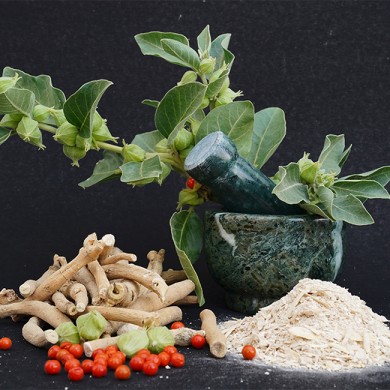
Next
On this page How Quickly Does Ashwagandha Work? How Do I Know if Ashwagandha Is Working? Elements Influencing the Time Ashwagandha Needs to Show Effects WeightWorld Ashwagandha KSM-66 Tablets - 180 Tablets 1500mg Tips for Maximising Ashwagandha’s Effects Final Say...
Most Viewed Articles

